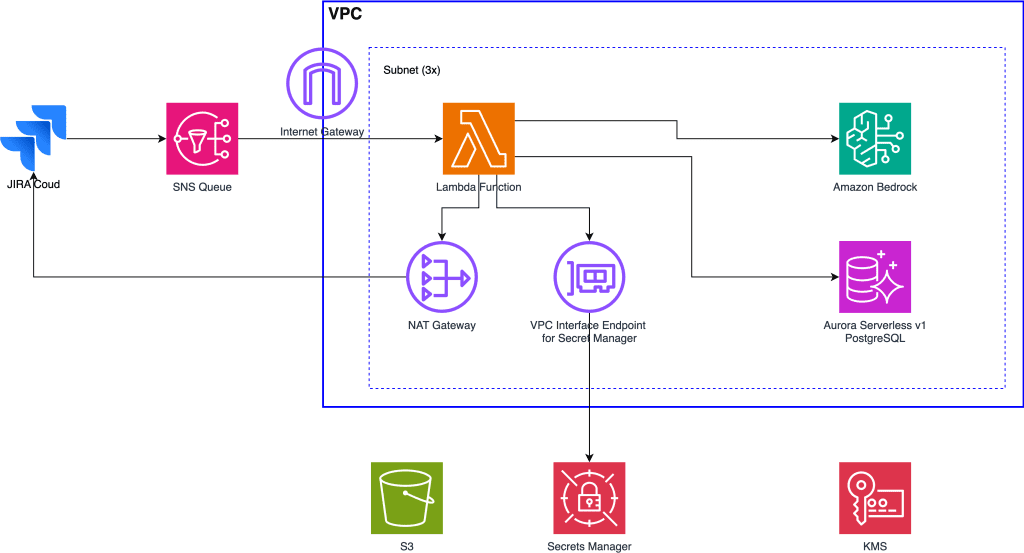
Generative AI securely at work: automated ticket analysis in AWS Cloud
Recurring manual tasks tie up time and qualified resources in many IT departments – especially in the area of IT security. Vulnerability scanners regularly generate new entries in central ticket systems such as JIRA or ServiceNow. The manual review and classification of these tickets is time-consuming, error-prone and hardly scalable.
In a recent customer project, we showed how Generative AI (GenAI) can be used beyond traditional chatbots – for the intelligent automation of real business processes. The main goal of our approach is to create a secure, cloud-based solution, which meets the specific requirements of organizations in the public sector.
RAG, Embeddings & AWS: the technological approach
At the heart of the solution is a so-called Retrieval Augmented Generation (RAG) approach. This involves comparing new content – in our case: ticket texts and content – with existing, already evaluated entries. The aim is to automatically recognize semantically similar tickets and derive follow-up actions.
Embeddings are used for this purpose: Text content is translated into mathematical vectors that make it possible to compare similarities in meaning mathematically. Vectors can be imagined here just like in school, except that they do not have 2 or 3 dimensions, but 256 dimensions. This is particularly helpful when the same content is formulated differently.
Our solution is based entirely on services from the AWS Frankfurt region. Among other things, we use:
- Amazon Bedrock (Titan) to generate the embeddings. Titan is a Large Language Model (LLM) trained by AWS, but it is relatively compact and therefore fast and inexpensive. It also runs completely in the AWS Frankfurt region.
- PostgreSQL with vector extension (on Aurora Serverless v2) for semantic matching
- AWS Lambda und SNS for orchestrating the data flows
A particular advantage of Aurora Serverless v2 is that the database automatically scales with the load – and even reduces to zero when inactive. This saves costs and makes the solution particularly economical for volatile usage patterns such as tickets, which are often transferred collectively to JIRA.
Architecture diagram of the automated ticket analysis

The core is a Lambda function that is called via JIRA Automations using an SNS queue. This in turn calls Amazon Bedrock for the inference and stores the data in an Aurora Serverless PostgreSQL. The database password is stored in the Secrets Manager. The KMS manages a key to secure the files “at rest” with an individual key. S3 is mainly used for provisioning the Lambda function and the associated layer.
Intelligent ticket assignment in practice
Our customer – a large global corporation with a strong IT focus – had a clear goal: the evaluation and forwarding of security-related tickets had to become more efficient. In cooperation with the IT team, we developed an AI-supported system that analyzes new vulnerability tickets, compares them with existing ones and automatically assigns them to a responsible team.
The advantages are obvious:
- Time saving: Manual review is no longer necessary for the majority of tickets.
- Consistency: Similar tickets are handled in the same way – regardless of the type of day or responsibility.
- Compliance: The solution fully meets the requirements of the customer-specific company policy on handling AI – especially as AI is not used to generate content, but only to compare tickets.
The system runs entirely in the AWS Cloud and meets the highest data protection requirements – an important point for companies in the public sector.
Business case: added value with common sense
The technical solution is lean – the economic benefits are clearly measurable.
A quick calculation example for one of the numerous IT teams in the Group:
- An IT employee with an annual salary of €70,000 spends 4 hours per week on manual ticket evaluation.
- This corresponds to around 5.800 € per year.
- In comparison: The AWS services used generate monthly operating costs of less than €5 – i.e. around €60 per year. The price is quite low, because of the extensive use of serverless services.
Conclusion: The investment in GenAI pays off even with smaller case numbers. Economies of scale further increase the savings.
Conclusion and outlook
Generative AI is more than just a chatbot. It helps companies to solve real challenges automatically – securely, scalably and comprehensibly. At PROTOS Technologie, we rely on cloud-native architectures, modular services and the highest data protection standards.
The next step: using the solution productively and rolling it out to other processes – for example in the areas of maintenance, incident management or customer service.
